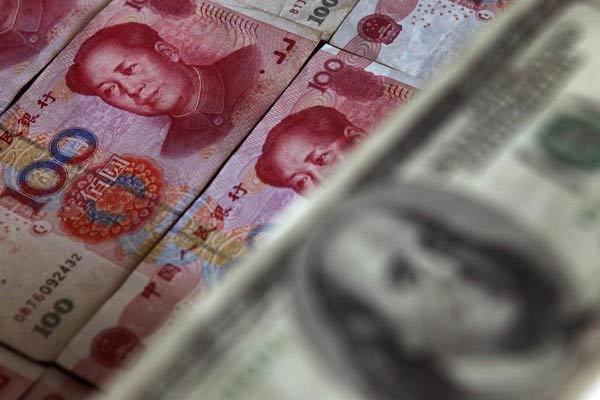Deficit hits $104b in first half
Updated: 2015-07-24 06:59
By CHEN JIA(China Daily)
|
||||||||
|
 |
|
A photo illustration shows a $100 banknote placed above Chinese 100 yuan banknotes in Beijing in May 10, 2013. [Photo/Agencies] |
Cross-border capital flows are becoming more balanced despite high volatility, authority says
The country saw intensified net capital outflow in the first six months as the foreign exchange settlement deficit increased, according to official data released on Thursday.
Chinese banks bought foreign exchange worth 5.31 trillion yuan ($855 billion) in the first half and sold the equivalent of 5.96 trillion yuan, resulting in a net sale of 647.4 billion yuan, the State Administration of Foreign Exchange said. This compares with a 383.8 billion yuan deficit in the second half of last year.
Experts say too much capital outflow in the long term could reduce liquidity in the domestic market, push down the value of the yuan and even slow down real economic growth.
Administration spokeswoman Wang Chunying said flows of capital in and out of the country have become more balanced in recent months, despite a high level of volatility in the first half. "There has been no large and continued capital flight so far, "Wang added.
The foreign exchange settlement had a surplus of 12.9 billion yuan in June, compared with a 7.8 billion yuan surplus in May and a 106.2 billion yuan deficit in April, the administration said.
Wang said risks may arise from possible moves by the US Federal Reserve to raise interest rates, but they will be "containable". "Normalization of the Fed's monetary policy will increase pressure on China's capital outflows, but we are confident we can meet the challenges."
The Fed will begin a two-day meeting on Tuesday, and experts said there is a 50 percent chance that it will push up interest rates.
Wang confirmed that the appreciation of the dollar was one of the most important factors behind the flow of capital out of China in the first quarter, but the market's expectations regarding the yuan's exchange rate remained stable in the second quarter.
Uncertainties created by the Greek debt crisis may influence China's cross-border capital flows because of resulting fluctuations in global foreign exchange markets, something that the administration will monitor closely, she added.
Zhu Haibin, the chief economist in China at JP Morgan, said the country is introducing reforms to further free up cross-border capital flows as it seeks to join the International Monetary Fund's foreign exchange reserve basket and push the internationalization of the yuan.
"The opening up of China's capital market as well as the foreign exchange reforms will continue, despite the capital flow volatility," Zhu said.
Bloomberg contributed to this story.

 Across America over the week (July 17- July 23)
Across America over the week (July 17- July 23)
 Unusual but true: 'Love' conquers all
Unusual but true: 'Love' conquers all
 Six dead as rainstorms wreak havoc in China
Six dead as rainstorms wreak havoc in China
 Guangzhou Evergrande stun Bayern in penalty shootout
Guangzhou Evergrande stun Bayern in penalty shootout
 10 domestic films to see this summer
10 domestic films to see this summer
 Tricks airports use to scare away birds
Tricks airports use to scare away birds
 The highs and lows of a stock market investor
The highs and lows of a stock market investor
 Culture insider: 7 things you may not know about Major Heat
Culture insider: 7 things you may not know about Major Heat
Most Viewed
Editor's Picks

|

|

|

|

|

|
Today's Top News
China eyes deepened cooperation with overseas NGOs
Beijing condemns Somali attack, mourns deaths
Monster Hunt breaks Chinese box office record
Olympic bid panel cites city's merits
Astronomers discover most Earth-like planet yet
Seattle Chinatown leader killed in shooting
Flight details of Obama's Kenya trip leaked
2 killed, several injured in Louisiana theater shooting
US Weekly

|

|






